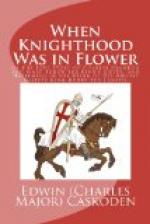Being thus in a position of affluence, I cared nothing for the fact that little or no emolument went with the office; it was the honor which delighted me. Besides, I was thereby an inmate of the king’s palace, and brought into intimate relations with the court, and above all, with the finest ladies of the land—the best company a man can keep, since it ennobles his mind with better thoughts, purifies his heart with cleaner motives, and makes him gentle without detracting from his strength. It was an office any lord of the kingdom might have been proud to hold.
Now, some four or five years after my induction into this honorable office, there came to court news of a terrible duel fought down in Suffolk, out of which only one of the four combatants had come alive—two, rather, but one of them in a condition worse than death. The first survivor was a son of Sir William Brandon, and the second was a man called Sir Adam Judson. The story went that young Brandon and his elder brother, both just home from the continental wars, had met Judson at an Ipswich inn, where there had been considerable gambling among them. Judson had won from the brothers a large sum of money which they had brought home; for, notwithstanding their youth, the elder being but twenty-six and the younger about twenty-four years of age, they had gained great honor and considerable profit in wars, especially the younger, whose name was Charles.
It is a little hard to fight for money and then to lose it by a single spot upon the die, but such is the fate of him who plays, and a philosopher will swallow his ill luck and take to fighting for more. The Brandons could have done this easily enough, especially Charles, who was an offhand philosopher, rather fond of a good-humored fight, had it not been that in the course of play one evening the secret of Judson’s winning had been disclosed by a discovery that he cheated. The Brandons waited until they were sure, and then trouble began, which resulted in a duel on the second morning following.
This Judson was a Scotch gentleman of whom very little was known, except that he was counted the most deadly and most cruel duelist of the time. He was called the “Walking Death,” and it is said took pride in the appellation. He boasted that he had fought eighty-seven duels, in which he had killed seventy-five men, and it was considered certain death to meet him. I got the story of the duel afterwards from Brandon as I give it here.
John was the elder brother, and when the challenge came was entitled to fight first,—a birthright out of which Charles tried in vain to talk him. The brothers told their father, Sir William Brandon, and at the appointed time father and sons repaired to the place of meeting, where they found Judson and his two seconds ready for the fight.
Sir William was still a vigorous man, with few equals in sword play, and the sons, especially the younger, were better men and more skilful than their father had ever been, yet they felt that this duel meant certain death, so great was Judson’s fame for skill and cruelty. Notwithstanding they were so handicapped with this feeling of impending evil, they met their duty without a tremor; for the motto of their house was, “Malo Mori Quam Fedrai.”




